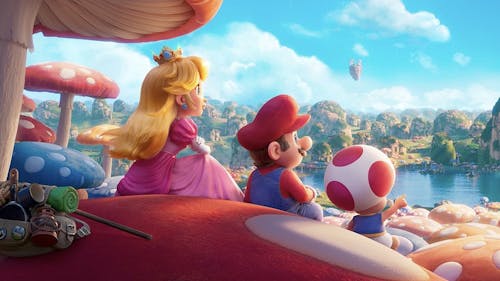'The Super Mario Bros. Movie' gets its coin, but doesn't impress fans or critics

While walking into the movie theater on Wednesday, I wasn't particularly thrilled to see (and later review) Illumination's newest film, "The Super Mario Bros. Movie." The film has been an internet talking point ever since its existence was officially announced in 2018 by former Nintendo President Tatsumi Kimishima.
The film's notoriety was only bolstered later in September 2021, when its cast was revealed during a Nintendo Direct presentation — drawing controversy was the decision to replace Mario's longtime voice actor Charles Martinet with Chris Pratt, presumably in an attempt to attach more recognizable talent to the project.
Going in, I already wasn't expecting much from this movie. One of my first articles published by The Daily Targum examined what I felt was Illumination cynically utilizing the ironic hype surrounding its films as free marketing. Needless to say, my feelings toward the company haven't changed much since October.
But it was also during this discussion that I perhaps promised my thoughts on "The Super Mario Bros. Movie" when it was released. And although I meant that to be somewhat facetious, I am nothing if not a man of my word.
So as they may or may not actually say in Brooklyn, let's-a-go.
In some ways, "The Super Mario Bros. Movie" is a by-the-numbers, classic Illumination, heavily focus-tested, animated film. In others, it serves as a striking reminder of how far the mediums of both cinema and video games have evolved over the last 30 years.
For those unaware (which I'm assuming to be the majority of those reading), "The Super Mario Bros. Movie" was not the first attempt to bring Nintendo's world-renowned plumber duo to the big screen.
That honor is reserved for the 1993 movie, "Super Mario Bros" — a film whose reception was so icy that alongside other video game-based titles at the time, 1994's "Street Fighter" and "Double Dragon," it essentially killed any Hollywood interest in adapting video games for the silver screen for years to come.
Although they're based on the same source material, the 1993 movie is the perfect opposite of its modern-day counterpart. On top of being live-action instead of animated, the film features a much grittier tone and atmosphere, including a raunchier version of Mario, played by Bob Hoskins.
If you're expecting to be able to draw comparisons between the 90s version and the "The Super Mario Bros. Movie," first, I would assume you're entirely unfamiliar with Illumination's movie-making style (in which case I would recommend my previously mentioned article).
Second, I hate to disappoint, but the movie really doesn't stretch much outside the Illumination wheelhouse of being a cute and inoffensive (if not dull and pandering) experience aimed primarily at keeping kids occupied for 90 minutes.
To that end, the movie is perfectly serviceable. It certainly had no issue entertaining the theater full of children, parents and 20-somethings with whom I shared the experience of viewing it. But I found myself wearing the same blasé expression with which I'd entered the theater, save for the occasional smirk, throughout the entirety of the film's runtime.
In the film's initial marketing stages, there was one major concern raised about the idea of a reimagined Mario-centered movie: What kind of story coming from such a notoriously milquetoast production company as Illumination could audiences expect to see?
The Mario games have somewhat cemented a reputation as being light on story content. They usually boil down to the same damsel in distress narrative of the titular plumber rescuing Princess Peach from Bowser. As a result, many were curious to see how any studio could stretch out such a simple concept for the runtime of a feature-length movie.
"The Super Mario Bros. Movie" isn't so much an adaptation of any one particular game in the series. Instead, it's an original story set in the Mario world, which borrows elements and set pieces from other spin-off games touting the "Mario" name, such as "Mario Kart."
Bizarrely, even though the two movies are at odds on almost every level, both the 1993 and 2023 Mario movies feature stories about the plumber brothers entering another world found deep underneath New York City.
Additionally, both titles take the liberty of establishing their own lore for the Mario brothers. The 2023 film places the duo as idealistic dreamers in a family skeptical of their aspirations to operate their plumbing business.
It's fairly obvious that Illumination's motivation to include Mario's family was an attempt to make him appear more relatable and to define his loosely established character motivation of needing to prove himself to his overly critical family.
In fact, "loosely defined character motivations" is a fairly succinct summary of my thoughts on the movie as a whole. "The Super Mario Bros. Movie" solves the problem of its source material lacking a feature-length-worthy storyline by just creating a typical animated children's movie and giving it a Mario coat of paint.
If I can give this movie any praise, Jack Black as Bowser was a fairly enjoyable performance. I won't go so far as to say he salvaged the production, but his character was a nice change of pace from Pratt's predictably flat deliverance.
Additionally, I did get a kick out of some of the references to Nintendo's legacy titles. They're hamfisted, overabundant and pandering to retro gaming enthusiasts like me — but I'm happy to see Nintendo even acknowledge the existence of "Kid Icarus," in hopes that it may lead to another game in the criminally under-utilized franchise in the not-too-distant future.
Overall, I would rate "The Super Mario Bros. Movie" a 6 out of 10. If you have kids, it'll give them something to do for an hour and a half, and parents might get a kick out of the 80s-inspired soundtrack.
Or perhaps both these groups will appreciate the novelty of sharing a cross-generational experience — whatever Illumination executives can cite as justification for the sequel.



